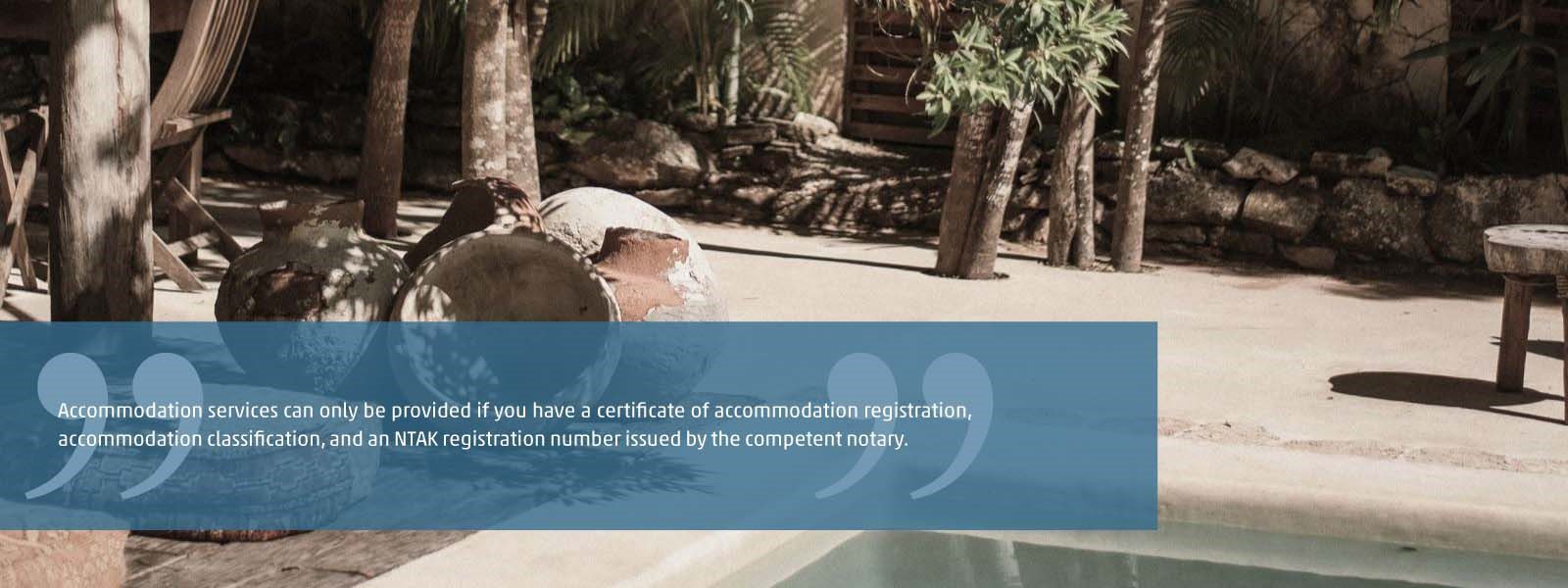We’re in the middle of summer, when even those who have been working hard and are just starting to browse the offers of accommodation providers on the various online platforms are feeling the need to relax, and those who have been resting or settling down in their holiday homes are finally starting to reap the benefits. Private individuals who occasionally let out their holiday homes – even on an ad hoc basis – are considered to be private accommodation providers, so they should also consider what tax options and registration obligations arise and what tax rules they will have to comply with when letting their property.
What constitutes private accommodation?
Whether you let your holiday home or apartment as a private individual or as a self-employed person, as long as it has no more than 8 rooms and 16 beds it is considered private accommodation.
Paying tax as a private individual with a tax number is generally recommended for short-term lets of accommodation providers on an ad hoc basis to supplement income, while for regular and commercial letting, taxation as a self-employed person may be preferable.
If self-employed, accommodation providers can choose between two taxation methods: flat-rate tax up to a certain threshold, or taxation according to entrepreneurial personal income tax.
What does not qualify as private accommodation?
If the activities of the operating company include the provision of accommodation services, which it does not carry out as a private individual or as a self-employed person, and the accommodation has no more than 25 rooms and 100 beds, it is considered to be other accommodation.
Other accommodation operators may be companies specifically set up for this activity, or companies operating such accommodation as part of their business, and they may be subject to the normal corporate tax options – but the tax treatment of private accommodation operators is less well understood.
Taxation options of accommodation providers as private individuals
As private individuals, accommodation providers can choose between two taxation methods. The first is flat-rate taxation, while the second is taxation under the rules for independent activity. The latter can be done either with itemised cost accounting or by applying a 10% cost ratio. Here, the general rate of 15% under the Personal Income Tax Act is applied, and in certain cases a social contribution tax liability of 13% too.
Accommodation providers taxed as private individuals can opt for flat-rate taxation if they conduct such activities in no more than three dwellings or holiday homes per tax year, and do not rent out the dwelling or holiday home to the same person for more than 90 days in the fiscal year. The flat-rate tax is HUF 38,400 per room, payable in equal instalments by the 12th day of the month following the quarter. In the case of the flat-rate tax, the full amount must be paid even if the flat-rate taxpayer starts their activity during the year, or only receives guests intermittently, e.g. during the summer season.
One might rightly ask what constitutes a room in this case. A room is a unit which can be sold separately, has individual access, consists of one or more premises and is suitable for accommodating one or more guests at the same time. So an apartment that has two bedrooms, but is not suitable for letting the two bedrooms separately, is considered a single room in a single accommodation unit.
Other payment obligations
In addition to the above “annual taxes”, accommodation providers are obliged to pay the NAV a 4% tourism development contribution on the value of their services, which since April last year is no longer subject to the coronavirus-related moratorium. The contribution must be declared and paid by those who provide commercial accommodation services and catering services for food and non-alcoholic beverages prepared on the premises.
Of course, you also have to pay value added tax to the NAV. Long-term property letting is essentially a tax-exempt supply for VAT purposes, but payment of VAT is mandatory for commercial accommodation services. Provided they do not exceed the current threshold of HUF 12 million, accommodation providers may opt for VAT-tax exemption (this threshold is expected to increase in the future).
In addition to the above, the local government for where the accommodation is located may also levy tourist tax, building tax, municipal tax or even parking fees. In all cases, it is worth checking the website of the given local government, where these issues are regulated in published local decrees.
Other registration obligations
To start a private accommodation service, the activity of self-employed persons or private individuals with a tax number must be declared using the ÖVTJ code 552014 on form 24T101. Don’t forget to indicate on the form the option for exemption from VAT, if applicable, or the option for the flat-rate tax, if applicable.
It is important to note that accommodation services can only be provided if you have a certificate of accommodation registration, accommodation classification, and an NTAK registration number issued by the competent notary.
From 2019 onwards, accommodation providers have to register all domestic accommodation with the National Tourist Data Centre (NTAK). NTAK reporting is one of the legal requirements for providing accommodation services. NTAK registration can be performed once you have your tax number, you’ve chosen your accommodation management software and you have NAV government portal access. The Hungarian Tourism Agency provides a free accommodation management platform, Vendégem, for operators of private accommodation.
As of 2021, accommodation services can only be provided in classified accommodation establishments. This mandatory classification must be sought before officially notifying the accommodation service activity to the notary. The classification is carried out by the Hungarian Tourism Quality Certification Board based on a public set of requirements, as part of an on-site inspection. The first classification is free of charge, but thereafter a review is mandatory every three years. After successful classification, accommodation providers can register their accommodation service with the competent notary, who issues a certificate of registration.
More detailed information on this can be found in the information booklets on the websites of the Hungarian Tourism Agency and the National Tax and Customs Administration.
The tax advisers at WTS Klient Hungary have decades of experience in the field of taxation related to rental properties, and keep up to date with the latest changes in the relevant legislation. In this article we endeavoured to provide useful information mainly for private individuals, but we are also happy to provide long-term tax advice on real estate matters for corporate clients too.











